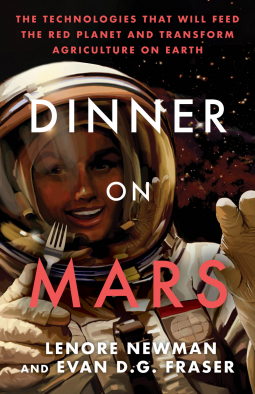What do you think?
Rate this book


232 pages, Paperback
Published October 11, 2022
As the two of us have gone on this imaginary mission, we've come to believe a Martian community can and will feed itself successfully, and that in doing so, develop technologies that will revolutionise agriculture on Earth. [loc. 86]
I greatly enjoyed Lenore Newman's Lost Feast: Culinary Extinction and the Future of Food, so I leapt at the chance to review her new book, co-written with fellow food scientist Evan D. G. Fraser. Dinner on Mars was conceived during the early months of the Covid pandemic, when the authors were unable to travel or meet in person. It's a thought experiment that begins with the fate of Sir John Franklin's Arctic expedition, and examines the unique environmental challenges that must be met by a self-sustaining Martian colony. There's a lot about soil, radiation, insolation and so on: but there's also an emphasis on the human side of the equation, the spiritual/emotional need for greenery and plant life, the role of shared meals in a society, the importance of food as a pleasure and not merely as fuel.
Newman and Fraser examine the failings and inefficiences of modern agriculture -- which relies on the suffering of animals, the availability of cheap labour, and the profligate (ab)use of non-renewable resources: they describe and decry the ecological impact of dairy farming, and the environmental and health problems caused by agricultural industry. As much as 30% of all food produced is wasted.
Food production on Mars, where every input and output must be carefully balanced, would likely tend towards a vegetarian diet, perhaps with 'meat' grown by farming animal cells, rather than the animals themselves. Digital tools and monitoring systems would enable the system to be fine-tuned; new technologies would be developed as solutions to problems that don't even exist on Earth.
"But you do realise that it will be much easier and cheaper just to save Earth than go to Mars to figure these things out?" asks one scientist. Quite accurate, but the lure of Mars is an attractive one -- there are frequent references to Musk, Bezos and Branson in Dinner on Mars -- and if 'space science' can revolutionise life on Earth, that's another benefit of the space programme.
I found this an inspiring read, despite occasional pronoun weirdness: the oddity of a co-authored book that refers to the authors individually in the third person and collectively in the first person plural. ("Lenore thinks that Evan may be onto something here. In one of our conversations, she noted ..."). Dinner on Mars appeals to me as an SF reader, as well as a reader of social anthropology and the history of food. I was especially cheered to find a mention of Kim Stanley Robinson's Mars trilogy as 'a classic everyone should read': indeed, I'm oddly tempted to reread at least Red Mars, to see how ideas about feeding a Mars colony have moved on since the 1990s.
Highly recommended, fascinating, and extremely relevant to life on Earth, Dinner on Mars is a book I'll be recommending to many of my friends.
Fulfils the ‘food’ rubric of the Annual Non-Fiction Reading challenge.
Thanks to the publisher and Netgalley for the advance review copy, in exchange for this honest review. UK publication date is 11 October 2022.